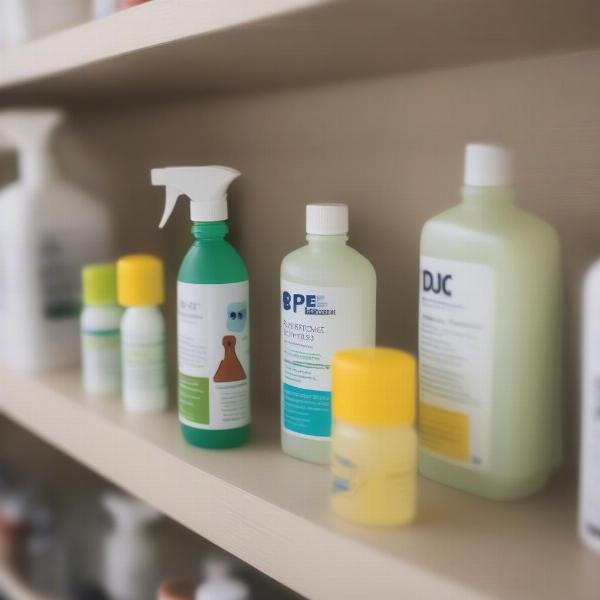Dealing with dog pee accidents can be frustrating, especially when the odor lingers. A dog pee enzyme cleaner is your best weapon in this fight. These cleaners work by breaking down the uric acid in dog urine, eliminating the source of the smell rather than just masking it. This guide will explore everything you need to know about dog pee enzyme cleaners, from how they work to choosing the right one for your needs.
Understanding the Power of Enzymes
Why are enzymes so effective against dog pee? Unlike regular cleaners that simply cover up the smell, enzyme cleaners tackle the root of the problem: uric acid crystals. These crystals are the culprits behind that lingering, ammonia-like odor, and they can persist in carpets, upholstery, and even hardwood floors. Enzyme cleaners contain special proteins that break down uric acid into carbon dioxide and water, effectively neutralizing the smell and preventing your dog from being drawn back to the same spot.
Choosing the Right Dog Pee Enzyme Cleaner
With numerous enzyme cleaners on the market, selecting the best one can be overwhelming. Look for products specifically designed for pet urine and check the ingredient list for protease, amylase, lipase, and cellulase, which are key enzymes for breaking down organic matter. Consider also the surface you’re cleaning – some cleaners are better suited for carpets, while others are formulated for hard floors. Always test the cleaner in an inconspicuous area first to ensure compatibility with your flooring or fabric.
 Various Enzyme Cleaners
Various Enzyme Cleaners
How to Use Dog Pee Enzyme Cleaner Effectively
Using an enzyme cleaner correctly is crucial for achieving optimal results. First, blot up as much urine as possible with a clean cloth or paper towels. Then, saturate the affected area with the enzyme cleaner, following the product instructions carefully. Allow the cleaner to dwell for the recommended time – this is essential for the enzymes to work their magic. Avoid scrubbing, as this can spread the urine and damage the surface. Finally, allow the area to air dry completely.
Why Other Cleaning Methods Fall Short
While traditional cleaning products might seem like a quick fix, they rarely eliminate dog pee odor completely. Bleach, for example, can actually react with the ammonia in urine and create toxic fumes. Fragranced cleaners merely mask the smell, which can be confusing for your dog and even encourage them to re-offend in the same spot. Only enzyme cleaners truly eliminate the odor-causing uric acid.
What if the Smell Persists?
Sometimes, despite your best efforts, the dog pee smell might linger. This could indicate that the urine has penetrated deep into the padding or subfloor. In such cases, you might need a more intensive treatment, such as professional carpet cleaning or even replacing the affected area. Consider using a black light to identify all urine spots, ensuring you treat the entire contaminated area.
Preventing Future Accidents
While enzyme cleaners are excellent for cleaning up accidents, preventing them in the first place is the ultimate goal. Ensure your dog has regular potty breaks and address any underlying medical conditions that might be contributing to accidents. Dog indoor toilet can be a great solution for apartment dwellers or those with limited access to outdoor space. Consistent training and positive reinforcement are also key to housebreaking success. If you’re struggling with persistent accidents, consult a veterinarian or a certified dog trainer.
Conclusion
Dog pee enzyme cleaner is an indispensable tool for any dog owner. Its ability to neutralize odors at the source makes it far superior to traditional cleaning methods. By understanding how enzyme cleaners work and using them correctly, you can maintain a fresh-smelling home and a happy, healthy dog. Remember to always follow product instructions and address any underlying behavioral or medical issues that might be contributing to accidents.
FAQ
-
How long does it take for an enzyme cleaner to work? It usually takes several hours to a few days for the enzymes to fully break down the uric acid.
-
Are enzyme cleaners safe for pets? Yes, most enzyme cleaners are non-toxic and safe for pets once dry. However, it’s always best to keep your dog away from the treated area until it’s completely dry.
-
Can I use an enzyme cleaner on hardwood floors? Some enzyme cleaners are specifically formulated for hardwood floors. Check the product label to ensure compatibility.
-
What if my dog keeps peeing in the same spot? This indicates that the uric acid crystals haven’t been completely removed. Try a stronger enzyme cleaner or consider professional cleaning.
-
Can I make my own enzyme cleaner? While there are DIY recipes online, commercially available enzyme cleaners are generally more effective and reliable.
-
How often should I use an enzyme cleaner? Use it whenever a dog pee accident occurs.
-
Will enzyme cleaners remove old urine stains? They can be effective on old stains, but success depends on the severity and age of the stain.
Related Articles:
- artificial grass stinks of dog pee
- how to keep dogs from pooping in your yard
- best rugs for dogs that pee
- dog pee smells strong
About ILM Dog: ILM Dog is your trusted resource for expert advice on all aspects of dog care, from breed selection and health to training, nutrition, and grooming. We offer practical tips and insights to help you provide the best possible care for your canine companion. Whether you’re a seasoned dog owner or just starting out, ILM Dog has the information you need. Contact us at [email protected] or +44 20-3965-8624 for personalized guidance and support.